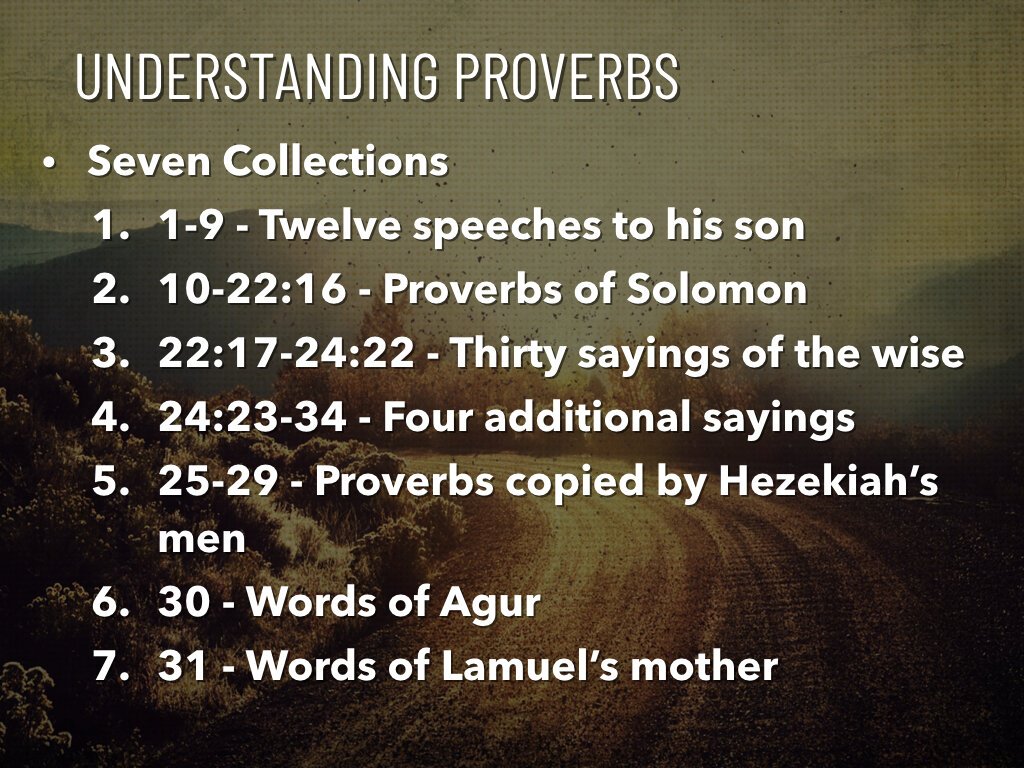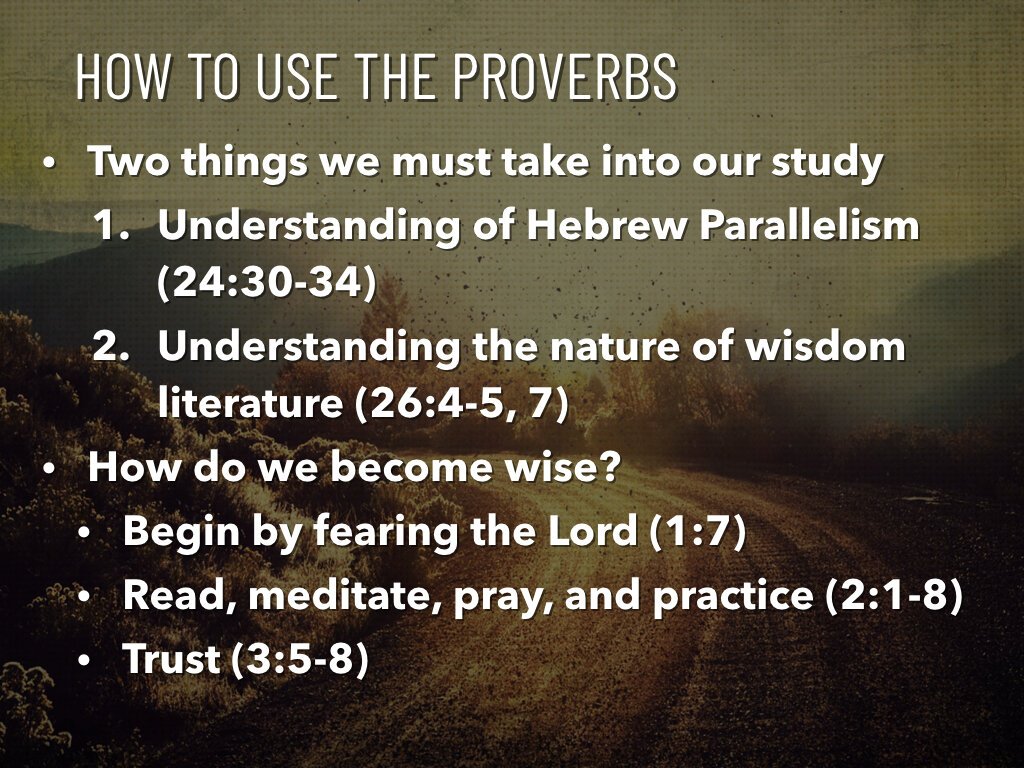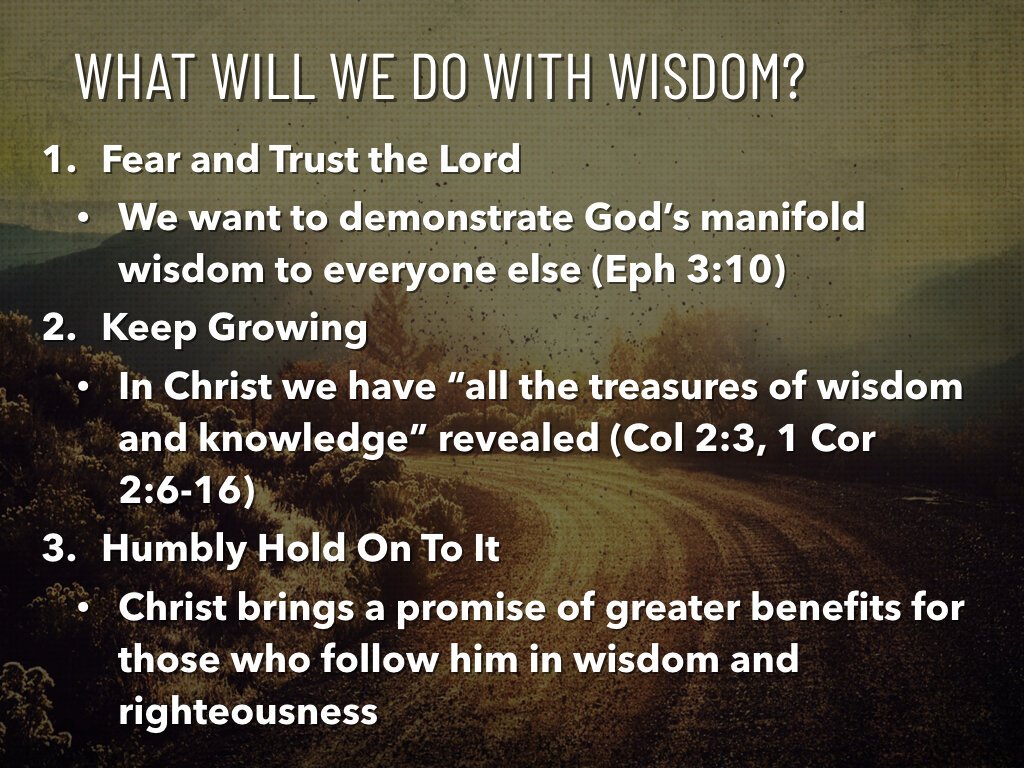The Pursuit of Wisdom (Proverbs)
December 29, 2019
What are proverbs?
Proverbs are condensed truths that have been found by the wise and those who have experienced life. Most of the proverbs in this book are simple two-line sayings, much like sayings that we have in our day. We would say things like, "A bird in the hand is better than two in the bush," "A stitch in time saves nine," or "If you don't use it, you lose it." These proverbs form the way we look at life, and they help us make wise decisions.
This helps us understand why the proverbs were written. We create proverbs today to give advice to people and improve their life. Solomon provides over a thousand proverbs to help the coming generations have a better life. These words show the path to godly and good living.
Understanding the Book of Proverbs
Look at the introduction in Chapter 1.
Proverbs 1:1--7 (ESV) --- 1 The proverbs of Solomon, son of David, king of Israel: 2 To know wisdom and instruction, to understand words of insight, 3 to receive instruction in wise dealing, in righteousness, justice, and equity; 4 to give prudence to the simple, knowledge and discretion to the youth--- 5 Let the wise hear and increase in learning, and the one who understands obtain guidance, 6 to understand a proverb and a saying, the words of the wise and their riddles. 7 The fear of the Lord is the beginning of knowledge; fools despise wisdom and instruction.
In the introduction, we have a purpose. Solomon wants the "simple" to become wise, and the wise to become even wiser. The term "simple" is not derogatory. It is merely a description of people who have not developed their understanding of life yet. They are paralleled to the youth in verse 4. In a sense, this is essentially a parenting manual for teaching and raising our kids, and I'm not just talking about the sections that discuss disciplining our children. There are proverbs here that help prepare young people for life. If we weren't raised with parents that give us instruction on how to have a good life, we can go to the proverbs and find much of what they should have said. Solomon is trying to fill in the gaps for us.
If we are fathers and mothers, we need to know the Proverbs to prepare our children for life. It is in this book that we find advice for what to teach them. Throughout the Proverbs, we get the sense that this was compiled by a father to teach his son. He wants him to know how to make the right decisions that will affect the rest of his life.
As adults, we can see the need for a book like this. Looking back on our lives, we could probably point to several bad decisions or right decisions that made us who we have been in the past and who we are now. Imagine if you knew then what you know now. Young people need to see the far-reaching consequences of their choices so that they have a chance to make the right decisions. That is what this book aims to accomplish. But in the introduction, he says that he is also seeking to give those with some wisdom more wisdom. Those of us with less experience and wisdom than Solomon need instruction and help to understand this life as well. Do we have a contentious wife? What are we going to do about it? Are we struggling with financial decisions? Solomon might be able to help us. Are we always suffering as a result of our poor choices? Maybe there is something that we could do differently.
The Layout of the Book
This book is comprised of seven collections, three of which are directly attributed to Solomon, and the other four seem to be wise sayings of which he has approved.
Twelve Speeches, Three Poems (Collection 1)
The first collection is twelve speeches from a father to his son, along with three poems from lady wisdom. This section is the easiest to read, and it makes up the first nine chapters of the book. Each speech begins with either, "Hear, my son" or "My son." In this section Solomon tells his son: Do not follow sinners because they will turn and kill you (1:8-19); Fear and honor the Lord, and he will provide what you need (3:1-10); Appreciate the Lord's discipline because he is helping you grow (3:11-20); Pursue wisdom, and you will find exaltation and a long life (3:11-4:27); Stay away from a forbidden woman, she will drag you down to Sheol (5, 7); Listen to your mom and dad to have a good life (6:20-35).
This section ends with two poems about lady wisdom. In Chapter 8, he points out all of the good things that lady wisdom wants to help us find. She is crying out and asking us to come to her so that we can find godliness and experience a long, happy life. In Chapter 9, he compares lady wisdom with lady folly. Wisdom wants to help the simple become wise, but folly intends to deceive and kill the simple, seducing him with pleasures and wickedness.
This section is the easiest to read and understand. It has a clear progression of thought throughout each speech and poem. The next parts are not so easy.
Proverbs of Solomon (Collections 2-5)
Chapters 10-29 is a grouping together of many proverbs by Solomon for his son. It is assumed that he created all of the proverbs from 10-22. Chapter 22:17 transitions to thirty sayings he wants his son to hear so that he may trust in the Lord. At the end of Chapter 24, he gives four more sayings. Then, we find more proverbs of Solomon that were copied down during the reign of Hezekiah between chapters twenty-five and twenty-nine.
Trying to just read through all of these proverbs is more of a chore than a pleasure. One proverb does not typically relate to the next. So we have hundreds of disjointed sayings thrown together into a smorgasbord. There does seem to be some rationale for the grouping of the proverbs, but knowing the logic doesn't help you deal with the issue of digesting all of this information. There are several themes throughout. To see those themes, we might want to look for additional resources that group the themes for a study of each. We don't have to do that, but it might be a good way to study the proverbs. We can learn how to work, how to relate with our wife/children/family/friends/enemies, how to overcome mistakes, how to treat someone who is grieving, how to eat at the king's house and many more helpful tips.
The Words of Agur (Collection 6)
In Chapter 30, we have an oracle from a man named Agur. Agur looks at himself and sees that he is not wise at all. He is the model reader of the book of Proverbs. After the reader nears the end of the book, he may feel wise, but he must recognize like Agur that he is not even close. Then, he spends most of Chapter 30 with poetic proverbs that resemble riddles.
The Words of Lemuel's Mother (Collection 7)
The final section of the book is perhaps the most known. Chapter 31 contains the words of King Lemuel. But it is actually an oracle that his mother gave to him. In this oracle, his mother wisely tells him to resist the urge to give his strength to a woman or wine. These two things will ruin his reign. Then she tells her son to pursue a woman who fears the Lord and is seeking righteous living. She lifts up her husband, her family, and her community by godly living.
The book begins with words of wisdom from a father and concludes with words of wisdom from a mother.
How To Use Proverbs
So now that we can see a layout of the book, how is this book intended to be used? There are two tips I want to make sure you have to prepare you to study the proverbs.
1. Each proverb has parallelism. That means that it is made up of two or more lines that relate to each other. Our goal in studying the proverbs is to understand how the comparison adds meaning to the first line.
2. All the proverbs have specific applications that make sense, but many do not make sense in every circumstance. To see that more clearly, look at Proverbs 26.
Proverbs 26:4--5 (ESV) --- 4 Answer not a fool according to his folly, lest you be like him yourself. 5 Answer a fool according to his folly, lest he be wise in his own eyes.
This is a perfect example of the need to be discerning with the proverbs. These two seem to be contradictory, but there are some occasions where we would not want to answer a fool, and somewhere we would want to answer him. We have to look at each situation and decide which one it is. As we study, we must be open to the fact that these are general guidelines that often have exceptions. Job and Ecclesiastes point out these exceptions.
How Do We Become Wise?
The main question on our mind as we study the book is not so much, "How can I remember all of these proverbs." It is, "How do I become wise enough to avoid all of these pitfalls and live a good, godly life?" Knowing the proverbs does not solve all of our problems.
So how do we become wise? When we go back to the beginning, we find that "The fear of the Lord is the beginning of knowledge; fools despise wisdom and instruction" (1:7). In the introduction, he gives the conclusion of the matter. If we want to understand how to have a good life and how to live well, we need to start by fearing the Lord. To fear the Lord is not to be afraid of him, though that would be appropriate in some situations. To fear the Lord means to reverence him and respect who he is. The Lord is the one who has made all of life possible for everyone we know. He also created everything we know. He is all-knowing, all-powerful, and he sees every thought in our mind. He is great and awesome! Recognizing that helps us to have the right attitude from the start. We are nothing compared to him. So we must hold him up as holy and have a high regard for his word.
The way to wisdom is then laid out for us in Chapter 2.
Proverbs 2:1--8 (ESV) --- 1 My son, if you receive my words and treasure up my commandments with you, 2 making your ear attentive to wisdom and inclining your heart to understanding; 3 yes, if you call out for insight and raise your voice for understanding, 4 if you seek it like silver and search for it as for hidden treasures, 5 then you will understand the fear of the Lord and find the knowledge of God. 6 For the Lord gives wisdom; from his mouth come knowledge and understanding; 7 he stores up sound wisdom for the upright; he is a shield to those who walk in integrity, 8 guarding the paths of justice and watching over the way of his saints.
After we understand and have the proper reverence for the Lord, we are prepared to receive his words and treasure them. The word of God holds many keys to wisdom. We must read the word. Then we must meditate on the words we have learned, evaluating our lives and the deeper meaning of what we read. In verse 3, he says, "Call out for insight and raise your voice for understanding." So we must pray to God and ask for him to give wisdom and understanding. Verse 6 says, "The Lord gives wisdom; from his mouth come knowledge and understanding." Finally, in verse seven and 8, he says that God is watching out for those who are trying to live out what they learn through their studies. He is protecting us and helping us grow in righteousness and wisdom.
Proverbs 3:5--8 (ESV) --- 5 Trust in the Lord with all your heart, and do not lean on your own understanding. 6 In all your ways acknowledge him, and he will make straight your paths. 7 Be not wise in your own eyes; fear the Lord, and turn away from evil. 8 It will be healing to your flesh and refreshment to your bones.
The Message
The message of this book should be obvious. We all need to grow in wisdom. We are limited in our understanding of life and the way things work. There is not a person alive who has everything figured out. The older we get, the less we feel like we know. Wisdom is a life long pursuit that we need God's help with. In all of the book of Proverbs, there is an encouragement to grow in wisdom and live a righteous life. Common sense tells us that these things are good for us so we ought to be thankful to Solomon for sharing these things.
But did you know that one greater than Solomon has come to the earth? Jesus calls himself "something greater than Solomon." Was he crazy for saying that? No, Jesus is the wisdom of God in human form. As he lived on the earth, he showed a greater wisdom than the world has ever seen. He did not fall into any of the traps of wickedness. He embodied all that the Proverbs set forth as wisdom. He is the personification of wisdom.
We Need The Mind of Christ
The proverbs are a treasure to us, but Jesus is an even greater treasure. We may have wondered why God would have a book like Proverbs with sayings that sometimes aren't true. This has been the case with Psalms, Ecclesiastes, Job, and now Proverbs. God did that to show us how Christ completes all of these books. In Christ, we have "all the treasures of wisdom and knowledge" revealed (Col 2:3).
1 Corinthians 2:6--16 (ESV) --- 6 Yet among the mature we do impart wisdom, although it is not a wisdom of this age or of the rulers of this age, who are doomed to pass away. 7 But we impart a secret and hidden wisdom of God, which God decreed before the ages for our glory. 8 None of the rulers of this age understood this, for if they had, they would not have crucified the Lord of glory. 9 But, as it is written, "What no eye has seen, nor ear heard, nor the heart of man imagined, what God has prepared for those who love him"--- 10 these things God has revealed to us through the Spirit. For the Spirit searches everything, even the depths of God. 11 For who knows a person's thoughts except the spirit of that person, which is in him? So also no one comprehends the thoughts of God except the Spirit of God. 12 Now we have received not the spirit of the world, but the Spirit who is from God, that we might understand the things freely given us by God. 13 And we impart this in words not taught by human wisdom but taught by the Spirit, interpreting spiritual truths to those who are spiritual. 14 The natural person does not accept the things of the Spirit of God, for they are folly to him, and he is not able to understand them because they are spiritually discerned. 15 The spiritual person judges all things, but is himself to be judged by no one. 16 "For who has understood the mind of the Lord so as to instruct him?" But we have the mind of Christ.
God has revealed his mind to us in a way that has never been done before. Why did God choose to show us wisdom and knowledge to this extent through Christ? Paul tells us that it was so that we might be transformed to display the manifold wisdom of God in our own lives to everyone here on earth and those with power in the heavenly places (Ephesians 3:10). The Proverbs give us a good idea of how to live wise, godly lives through fearing/trusting in the Lord, and making wise decisions. It tells us how beneficial it will be for us. But Christ reveals a promise of resurrection and eternity for those who walk in his wisdom.
Conclusion
Are Christ and his cross foolishness to you? Those who do not fear the Lord cannot see the glory of it. The fear of the Lord is the beginning. Have you humbled yourself before him? We must all bow and submit to his wisdom and power to find his love and adoration. It is available for all.






